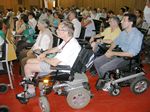In general, patients who are members of a well-operating fellowship do not feel so lost. These fellowships provide support that cannot be replaced by anything else in the battle with the disease: as the members are all in the same world, they never have to be ashamed in front of one another, and there is [&hellip
 In general, patients who are members of a well-operating fellowship do not feel so lost. These fellowships provide support that cannot be replaced by anything else in the battle with the disease: as the members are all in the same world, they never have to be ashamed in front of one another, and there is no other community where they could so openly discuss the problems they have to face every day, and which they will not even share with their family members.
In general, patients who are members of a well-operating fellowship do not feel so lost. These fellowships provide support that cannot be replaced by anything else in the battle with the disease: as the members are all in the same world, they never have to be ashamed in front of one another, and there is no other community where they could so openly discuss the problems they have to face every day, and which they will not even share with their family members.
Organizing communities requires a lot of work, therefore, all over the country, the best-operating local fellowships are the ones where an ambitious leader is surrounded by an active group of members. Besides providing thousands of Euros of direct support for the operation and programs of local communities, MSMBA is also committed to provide professional background support for the leaders of the clubs and associations that enables them to achieve results on their own within their areas. It is not sufficient to provide fish to the people, they should also be taught how to fish. This has been the aim of numerous professional trainings and in-service trainings announced and organized by MSMBA.
In order to succeed, one needs to learn how to find their way in the labyrinth of bureaucracy. This was addressed by an application writing and management training organized in 2001, as well as the computer operator trainings organized a number of times. In 2003, more than 30 thousand Euros of support was received through application from the National Employment Fund for the training and employment of fellowship leaders: project planning and learning about donation collection techniques were both part of the syllabus. Those concerned participated in a media training session in Budapest and an organization development training in Berekfürdő in 2005, and during the autumn of 2006, a complex education program of one and a half years could be launched. Participants could learn about labour market, public procurement, finance, information technology, EU related issues and application management at the University College of Nyíregyháza and at the local MS Centre, and they could also gain experience in providing psychological support, mental hygiene support and in conflict management.
Between 1999 and 2009, the Foundation spent nearly 90 thousand Euros on trainings; the vast majority of this sum was received via tender applications.







